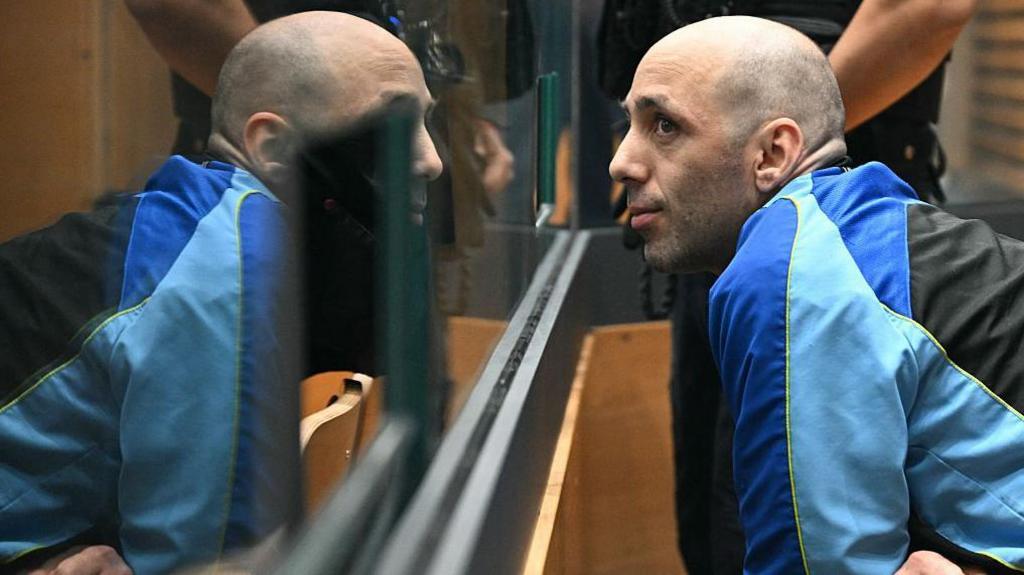France transfixed by murder trial without a body

Cédric Jubillar has always denied having been involved in his wife Delphine's disappearance
- Published
A French murder trial that opened Monday has transfixed the public because of the mystery at its core: where is the victim's body?
Cédric Jubillar, a 38 year-old painter-decorator, is accused of killing his wife Delphine nearly five years ago in a fit of jealous rage.
He has always denied the charges and, other than circumstantial evidence, investigators have struggled to build a case. There is no body, no blood, no confession, and no witness.
With its unexplained central fact and its cast of characters from small-town southern France, the affair has become a social media sensation.
Self-declared investigators have set up countless chat groups where they swap theories and share testimony – much to the irritation of police and families.
"These groups are the equivalent of the bistro counter – but with more people," said psychoanalyst Patrick Avrane, author of a book on attitudes to crime.
"Everyone constructs the theory that suits him or her the best."
The Jubillar mystery began at the height of Covid lockdown when – in the early hours on 16 December 2020 – Cédric Jubillar contacted the gendarmes to report that his wife had gone missing.
Delphine, who was 33 at the time, was a night nurse in a clinic not far from their home in Cagnac-les-Mines in the south-western Occitania region. The couple had two children, aged six and 18 months.
Police came to understand that the Jubillars did not have a happy relationship.
Cédric Jubillar was a habitual cannabis user and barely held down a job. Delphine was in a relationship with a man she had met over the Internet. She and Cédric were talking about divorce.
Police and locals conducted extensive searches in the surrounding countryside – with potholers descending into some of the disused mineshafts with which the area is dotted.
Delphine's body was never found, but a case was gradually built against her husband and in mid-2021 he was placed under investigation and detained.
The prosecution at the trial in the town of Albi will tell the court that Cédric Jubillar had a clear motivation to kill his wife, because of their impending split.
Lawyers will raise other points: certain odd actions by Cédric on the night of the disappearance; signs of a fight, including a pair of broken glasses; a neighbour who heard a woman screaming.
Cédric Jubillar's own character will be brought under the spotlight, with witnesses expected who will speak of his threatening language to Delphine before she disappeared, and his apparent lack of concern after.
Two of his acquaintances – a former cellmate and a former girlfriend – will also repeat what they told police: that Cédric confessed to the murder and told them where her body was.
But after more digging no body has been found, and the defence is expected to raise doubts about the veracity of the pair's accounts.
Indeed the heart of Cédric Jubillar's case is that there is nothing – beyond the popular view that he is the ideal culprit – to prove that he did away with his wife. He himself has always protested his innocence.
The trial is expected to last four weeks, with 65 witnesses called and 11 experts. More than 16,000 pages of evidence have been compiled.
Explaining the case's grip on the public mind, writer Thibault de Montaigu said in Le Figaro newspaper it was like "a novel by Georges Simenon" – creator of the fictional detective Inspector Maigret.
In a long analysis of the case, he said that for all the circumstantial evidence against Cédric Jubillar, the central question was this: how a "red-eyed, fuzzy-brained guy who smoked ten joints a day could have carried out the perfect crime?
"Killing his wife without leaving the slightest trace; secretly transporting her body, burying her in an unfindable location, then coming back to tell the police – all while his two children slept quietly in their bedrooms.
"And this was a guy who greeted the cops in panda pyjamas and then played Game of Thrones on his phone the very morning of the disappearance.
"So: genius bluffer; lucky fool; or poor innocent?"
The court will decide.